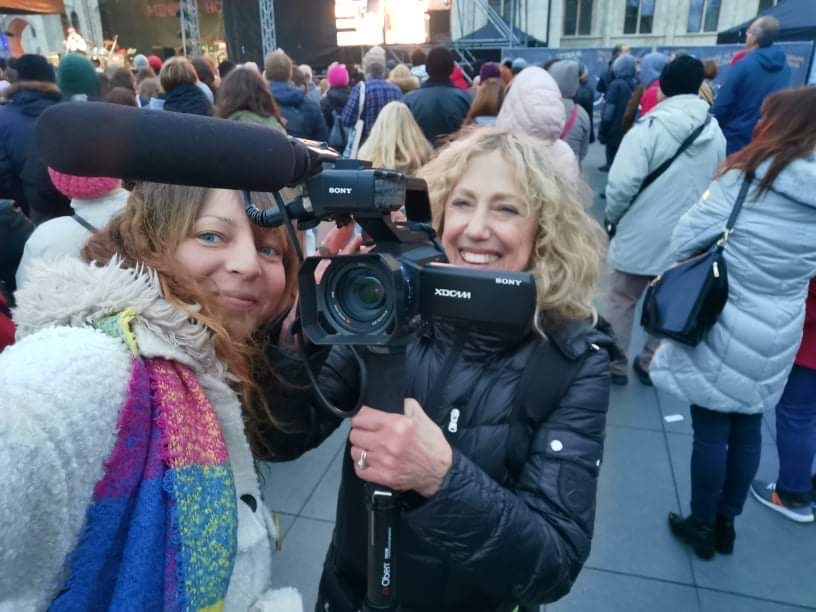An “evergreen” documentary, such as Connie Field and Marilyn Mulford’s Freedom On My Mind (1994), is a film whose information and themes are timeless. The Bay Area filmmakers’ Oscar-nominated oral history of the Civil Rights campaign to register Mississippi voters in the early 1960s (currently available to stream on TCM and Max) will be relevant forever.
‘Democracy Noir’ Depicts Hungary’s Dark Slide — and Foretells Ours

Field’s latest doc, Democracy Noir (screening March 12, 16 and 17 at the Roxie), about Prime Minister Viktor Orbán’s systemic 15-year (and counting) destruction of Hungary’s democracy, derives from the opposite impulse. Although its historical account and snapshot of individual resistance will resonate years down the road, Field’s goal was to have the maximum impact right now, right here.
After she premiered Democracy Noir at the prominent CPH:DOX festival in Copenhagen a year ago, Field intended the film to play U.S. theaters, alerting uninformed, misinformed and apathetic voters of the stakes of the 2024 election. It didn’t work out that way; the doc screened at festivals in the liberal enclaves of Mill Valley and Boston (and throughout Europe), but didn’t get a wider release.
If there is a silver lining — I’m trying very hard to accentuate the positive — to the vast damage done to the nation’s institutions by Donald Trump and his inside circle of billionaires since his second inauguration, it is that a whole lot more Americans are presumably interested in the autocratic Hungarian precedent on display in Democracy Noir.

Blending and finessing the past and the present since Orbán took office for the second time in 2010, Field traces the chronology of events and the opposition to Orbán through a trio of remarkable Hungarian women. Niko Antal, a nurse and the most emotionally vulnerable of the three, is perpetually protesting on the streets while working 18-hour days at minimum wage and paying for patients’ medicine out of her own pocket. You can imagine Antal’s facial expression when her mother, representative of the older generation, says Orbán has made her feel more secure.
Babette Oroszi, a respected and rising television journalist when she was in her 20s, was compelled to keep finding new venues as the right wing acquired roughly 400 media outlets in the years since Orbán came to power. The quiet, lovely home near a scenic waterway that she shares with her wife is a refuge from her stressful job.
Oroszi investigates and uncovers the regime’s malfeasance, pushing back against a tsunami of misinformation. “They’ve ruined education, they’ve ruined the health care system, they’ve screwed the . . . pensioners,” she laments.
By way of explaining the media environment, Democracy Noir depicts the shocking morning when the staff of the country’s largest newspaper, Népszabadság, which reported corruption scandals on a near-daily basis, found the building locked when they arrived for work and were fired almost immediately. Through the concerted flow of propaganda, the government has effectively brainwashed most of the population, mitigating the need for the most palpable sign of repression: calling out the military onto the streets.
One of Orbán’s strategies is funneling Hungary’s share of European Union funds to rural areas — new buildings, improvements in infrastructure and even sacks of potatoes — while claiming all the credit for his party, Fidesz. The result, unsurprisingly, solidifies Orbán’s base of support outside of Budapest.

Appealing opposition politician Tímea Szabó, Democracy Noir’s third protagonist, recounts recent history to Field’s camera. Her more compelling appearances, though, are on the floor of Parliament delivering impassioned, articulate and clear arguments against Fidesz’s policies. Szabó is a beacon of hope, that is, until one notices how empty the chamber is when she speaks.
Democracy Noir plays to U.S. viewers as a template for what has come to pass in the U.S., and is rolling out before our eyes. Television and radio networks peddling the state’s version of events, of course, but also the leader (whose power is never in doubt) relentlessly presenting himself and his followers as the victims, surrounded by enemies. And, ominously, the selective targeting of minorities — refugees, LGBTQ+ people — as the object of people’s blame, suspicion and hatred.
“If the government hates me so openly,” Oroszi asks, “then what am I doing here?” The nurse Antal, exhausted by the struggle, says, “I was raised to always fight for my dreams. I don’t have them anymore. Now I’m really just caught on a hamster wheel that I can’t get out of.”
Their despair runs into hard choices, such as moving abroad. Antal is reluctant to leave because her mother is ill. Ceasing to protest or tuning out aren’t options for people like her, Oroszi and Szabó. It is their country, after all, always and forever.
There is never any doubt which side Democracy Noir is on, but Field is careful not to slip into sloganeering and preaching to the choir. The film is most effective as a foreshadowing of the future we are heading toward in our own country, with shocking parallels between Trump’s statements and actions and Orbán’s.
At the same time, Democracy Noir provides, for our inspiration, three varyingly effective facets of resistance that involve — and transcend — keeping hope alive. As Bob Dylan sang, “It’s not dark yet, but it’s getting there.”
‘Democracy Noir’ screens March 12 (a benefit for Indivisible SF, with director Connie Field in conversation after the film), March 16 and March 17 at the Roxie.

